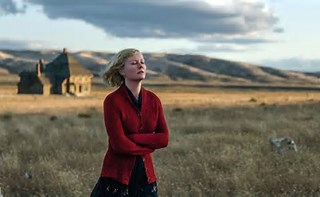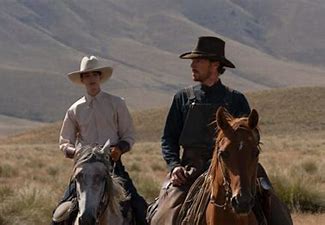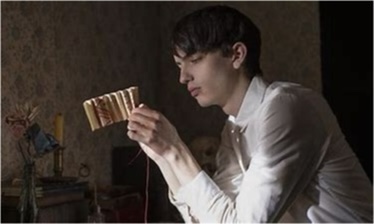OSCAR: JANE CAMPION FOR BEST DIRECTOR OF 2021
“The Power of the Dog” is one of the best films of 2021. Campion directs with an expert hand assisted by Ari Wegner’s cinematography and Jonny Greenwood’s memorable score.
It took me a few seconds to get used to Benedict Cumberbatch on a horse. His natural urbanity did not seem quite right during a Montana cattle drive circa 1925. But the great actor that he is, as soon as his character Phil Burbank turns to speak to his brother George (Jesse Plemons), I am with him, lost in the magic of Jane Campion’s movie. “The Power of the Dog,” based on Thomas Savage’s 1967 novel, is, together with Spielberg’s superb remake of “West Side Story, the Best Film made in English in 2021.

Dunst Finally Gets Her Due!
The cattle drive is to Rose Gordon’s (Kirsten Dunst) hotel and restaurant. During their stay, George (the nice brother) proposes to Rose, and she accepts. Her husband, we heard a little later, has, conveniently, just committed suicide! Meanwhile, Phil (the decidedly evil brother) viciously derides Rose’s tall, thin, effeminate son Peter (Kodi Smit-McPhee), whose papier mache flowers are the centerpiece of each table. Remember how good Smit-McPhee was as Viggo Mortensen’s little boy in John Hillcoat’s 2009 adaptation of Cormac McCarthy’s “The Road.” He’s just as impressive here.
Rose Moves In!
Rose quickly moves into the brothers’ large ranch house, packing Peter off to boarding school (he wants to be a doctor), with George fitting the bill. A hostile Phil meets her in the living room, and there is no escaping his animosity. His hatred of Rose is never explained. Is it because she’s a woman? Is it her presence in the house? Is it her coming between him and his brother, or a combination of the above? He’s especially harsh when she plays her new piano (purchased by George).
The Radetzky March.
As soon as she commences playing her party piece, “The Radetzky March,” Phil joins in on his banjo upstairs, and although what ensues is not precisely “Deliverance,” we know that this is a duel to the death. What we hear is Jonny Greenwood playing the cello. We all know this music, but it will never sound the same again. Under all this psychological pressure, Rose takes comfort in the bottle. When Peter returns for Summer Vacation, she is a raging alcoholic!
Rose’s Decline
Rose’s decline after her arrival at Chez Burbank is quite the plunge. Dunst, however, is so good, so heartbreakingly honest, that she makes it all believable. An actress who has been superb in so many movies, gliding back and forth with ease between lead and support, this role finally gets Dunst her due and her first Oscar nomination.

Peter and Phil
After Phil realizes that he can hurt Rose more by befriending Peter rather than mocking him, he teaches Peter how to ride a horse and shows him around the ranch. Phil has had quite a checkered past (including at stent at Yale!), but his most significant influence and, dare we say it, love was a farm hand called Bronco Henry. In one scene, Phil masturbates with Bronco’s old handkerchief! Gradually, Phil’s attitude toward Peter changes, especially after Peter quickly dispatches a rabbit, and both Phil and the audience realize that he is capable of cruelty. In addition, Peter has taken to riding around the ranch alone, and when he sees a dead steer, he carefully and scientifically, with gloves – anthrax is rampant in the herd – removes the hide, his premedical studies coming in handy.
Gay and Damaged.
The stage is therefore set with Phil and Peter as men who feel something for one another, gay men from two different generations who, although it is still the gay dark ages, especially in Montana, have already experienced various levels of freedom to be themselves (Peter has told Rose about a special friend in college). There is always a “Brokeback Mountain” echo to the movie, and Annie Proulx acted as a consultant to Campion.
Peter is Rose’s Avenger.
And then there is Peter as Rose’s avenger. He is a complex character to fathom. Smit-McPhee holds his cards close to his chest, only gradually revealing a Peter who is at once much more capable but much more ruthless than the audience expects.

The Climactic Stable Scene.
Segue into the movie’s climactic scene with Phil and Peter alone in the horse stable at night. Phil has promised to make Peter a lasso using Bronco Henry’s trusted methods. Still, he cannot complete the process because Rose has purposely sold all his rawhides to a traveling Native American salesman. Peter, however, says he has his own cache of carefully collected (read anthrax-contaminated) rawhides from his journeys around the ranch. As the two complete the project, Phil, encouraged by Peter, begins to reveal increasingly about his relationship with his old friend. There is a lot of sexual tension in the air, and just as we are sure they will be all over each other, CUT! Phil cannot get out of bed the following day because he is sick.
Campion directs this “psychological Western” with an expert hand, helped immeasurably by cinematographer Ari Wegner, who references the painters Andrew Wyeth and Lucien Freud and the photographs of English photographer Evelyn Cameron in her compositions.
And there is Jonny Greenwood’s haunting cello-based score, which adds immeasurably to the film’s overall tone.
The entire cast is excellent, including Plemons, who, unfortunately, does not figure prominently in the movie’s second half as the story gradually shifts toward Phil and Peter. However, his earlier scenes with Dunst are charming and delicate, contrasting with what is happening around them—something beautiful in this unforgiving landscape.
STREAMING ON NETFLIX
https://thebrownees.net/essay-one-1-2-65-queer-films-under-the-hays-code-1934-1967/
65 Queer Films Made Under the Hays Code (1934-1967) Part One. – TheBrownees
65 Queer Films Made Under the Hays Code (1934-1967). Part Two. – TheBrownees
65 Queer Films Made Under the Hays Code (Table) – TheBrownees
45 Queer Films from 1967-1976: Queer Cinema Comes Out – TheBrownees


















